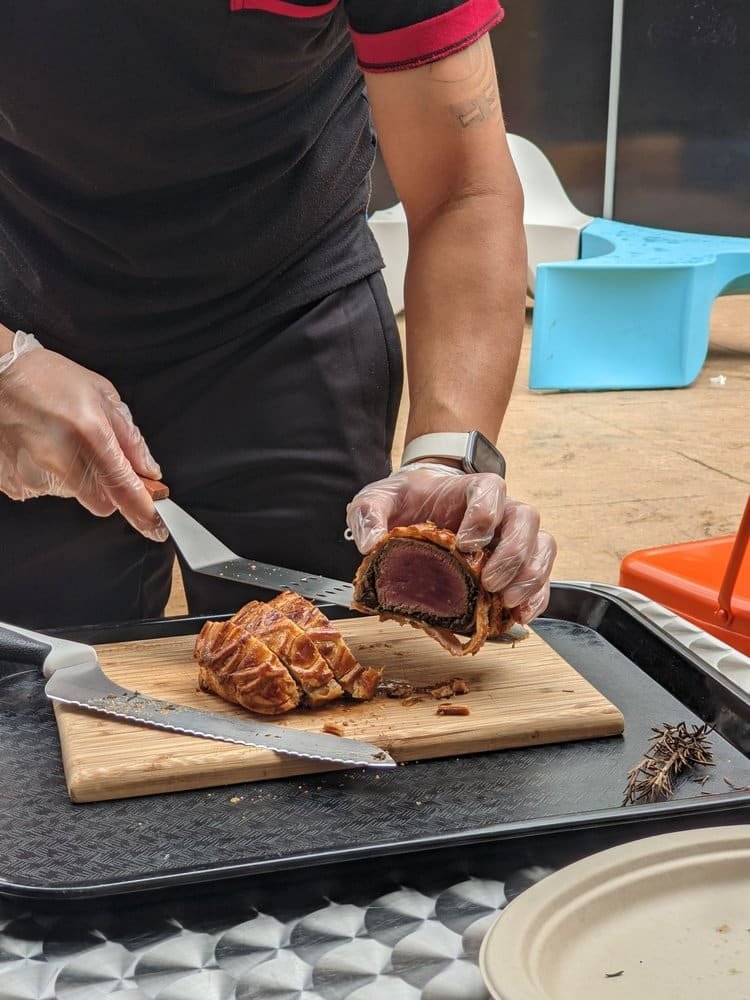In a mostly abandoned, former AMC Theaters food court, a tiny-but-mighty food space sits tucked into the back southern section of the concrete cocoon, where you’ll see a hodgepodge of red and orange chairs parked next to various wood and metal two-seater tables. And if there happens to be patrons using those chairs, they are eating food from a restaurant where plates of tom yum goong shrimp and Sichuan bean paste-coated pork belly sit next to beef Wellington and Portuguese egg tarts.
“This was just…,” a man eating that very braised beef pauses to address the chef who is peeking outside the door, Windex bottle in one hand and the other propping the door. “That was just great. The Brussels sprouts were honestly cooked to perfection,” the man continued, a smile coming the to chef’s face.
And even more? The menu not only works on all levels but offers genuinely quality food executed by a man who trained under famed Alinea Chef Grant Achatz—at the group’s Next restaurant, which Next Kitchen’s namesake is a nod to—and in the kitchen of Quince in San Franciso, the Michelin-star, lauded restaurant of Chef Michael Tusk.That man—the very man with the Windex by hand and the humble smile—is China native Chef Victor Zhou.

Zhou hails from from Changsga, the capital of the Hunan province and home to one of the most respected and mimicked cuisines in the world, its heat and spice often gets it compared to the more well-known (at least in SoCal) Sichuan cuisine, though the two are distinctly different. A part of the eight cuisines which make up China’s vast culinary empire, Hunan food means long-and-slow cooked meats, steamed fish heads, and plates that span salty, spicy, tart, and smoky.
For Zhou, one need not adhere strictly to one cuisine or another. In fact, he believes the culinary wonders of the world are meant to be explored—something he has long held when it comes to both Chinese cuisines and cuisines beyond the one he was raised on.
“Food is meant to be enjoyed,” Zhou said. “And I want people to experience something different… But most of my customers since opening [in August] have been from the offices, which has made business a bit slow. We want people to know we’re here and to experience something different.”
Certainly, Zhou honors his Hunan heritage: the slow-cooked pork is a wonderful nod to Mao’s braised pork, a plate that was given the was assigned “provincial standards” in 2013, meaning the quality supervision bureau of Hunan consider it a dish worthy of protection for its tradition, similar to the way in which wines and cheeses are protected in Europe.

Zhou, however, eschews some tradition: sticking with pork belly as his base, Zhou adds pixian bean paste—often called doubanjiang, this particularly brand of Sichuan bean paste comes from the Pidu District in Chengdu packs a slight mouth-numbing heat—that gives the dish a Sichuan twist that is both savory and sweet, spicy and salty.
With his deceptively simple chicken dish, Zhou exercises his European-cooking talents by opting for a sous-vide process—vacuuming the chicken in a bag and slow-cooking it for hours in a temperature-controlled bath of water—before charring the skin and bringing out the ginger and scallion flavors.
Then there is, of course, Zhou’s beef Wellington.
Surrounded in a beautiful encasing of decorative, cross-hatched puff pastry sits a chunk of filet mignon. That filet—wonderfully cooked, perfectly beefy—is slathered in a deeply earthy mushroom pâté, wrapped in smoky prosciutto before wrapped in that puff pastry. It is then sent off to the oven before being sliced table side and served. Or, if you wish, you can take home a raw version and, with particularly specific instructions—honestly, after reading them, you are solely to blame should your Wellington come out overcooked—and serve at home.
But genuinely, I suggest sitting outside of Next Kitchen. There’s a beautiful, at-odds dichotomy where, eating a wonderfully crafted beef Wellington or gnawing down on Zhou’s delectable spicy beef strips while people watching in a food court that is also home to a Johnny Rocket’s and plenty of empty storefronts. There is almost a peacefulness to the food court, which should be bustling but isn’t; an elegance to the food you’re eating, which shouldn’t be that elegant but is. It’s a perfectly and singularly American experience—and don’t forget the Portuguese egg tart as a reminder that you will, indeed, return again.
Next Kitchen is located at 245 Pine Avenue inside Suite 130 on the ground floor.


